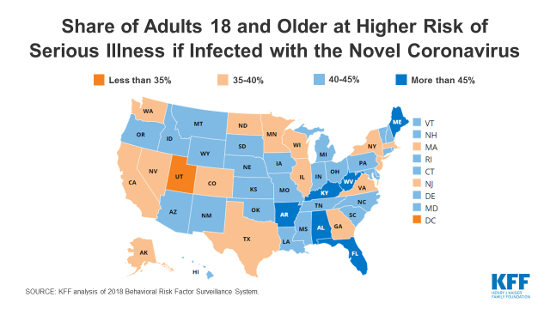
The independent source for health policy research, polling, and news.
About 4 in 10 Adults in the U.S. Are At Greater Risk of Developing Serious Illness if Infected with Coronavirus, Due to Age or Underlying Health Conditions
5.7 million Are Uninsured; State-Level Data Shows the Share at Higher Risk Varies By State
Based on current understanding of risk, forty-one percent of adults ages 18 and older in the U.S. have a higher risk of developing more serious illness if they become infected with the virus that causes COVID-19, because they are older or have serious underlying health conditions, or both, according to a new KFF analysis.
Of the more than 105 million adults at higher risk if infected with coronavirus, most – 76.3 million, or 72 percent – are age 60 or older, the analysis finds. However, the remaining 29.2 million adults in this group are ages 18-59 and are at higher risk if infected due to an underlying medical condition such as heart disease, cancer, chronic obstructive pulmonary disease (COPD) or diabetes.
Nearly 6 million people at higher risk are uninsured, including 3.9 million adults under age 60 and 1.8 million who are ages 60-64. (Virtually all adults ages 65 and older are covered by Medicare.)
The share of adults at higher risk of serious illness if infected with the virus varies across the country, ranging from 31 percent in Washington D.C. to 51 percent in West Virginia. In Washington State, California and New York, some of the states hardest hit by COVID-19 so far, the share of adults at higher risk is 40 percent, 37 percent and 40 percent, respectively.
“A large share of adults have underlying conditions that put them at risk of getting more seriously ill if they get infected with coronavirus, which is why extraordinary measures are so critical,” said KFF President and CEO Drew Altman. “They are not all seniors — twenty nine million are under sixty, and a large group – approximately 5.7 million – are uninsured,” he added.
The Centers for Disease Control and Prevention has issued guidance for people at higher risk of serious illness, advising them to avoid crowds, cruises and non-essential air travel, and to stay home as much as possible to further reduce their risk of being exposed. Information from the World Health Organization cautions that older people and those with underlying medical conditions are at higher risk of getting severe COVID-19 disease.
KFF researchers analyzed data from the 2018 Behavioral Risk Factor Surveillance System (BRFSS) to estimate the total number of adults nationwide, and by state, with an elevated risk of serious illness if infected because of their age or underlying health condition, based on the current information made available by CDC.
The analysis defines older adults as individuals ages 60 or older. Younger adults, ages 18-59, are defined as at “at risk” if they get infected with coronavirus and have heart disease, cancer, chronic obstructive pulmonary disease (COPD) or diabetes, although researchers recognize that risk factors, including age, are evolving as the disease spreads and more is learned about its effects on different populations.
For more data and analysis related to the COVID-19 crisis, including a look at how the coronavirus might affect residents in nursing facilities, visit kff.org.
